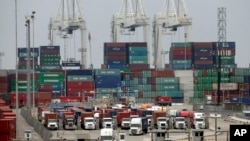Marathon talks to end a contract dispute with dockworkers that has tied up 29 U.S. West Coast ports for months continued Friday with a deadline looming.
U.S. Labor Secretary Tom Perez, participating in the talks for a fourth day, remained in San Francisco to try to broker a deal to end the standoff, which has disrupted trans-Pacific shipping and threatens to cost the U.S. economy billions of dollars. Media reports say the bargaining has stalled over the issue of binding arbitration.
The secretary told dockworkers and their employers that if they could not reach an agreement, he would take the discussion to Washington next week. The idea is that after nine months of talks, a change of scenery — and proximity to elected leaders eager to resolve the economically damaging situation — could help.
Forty percent of imported cargo comes into the U.S. through the ports of Los Angeles and Long Beach In Southern California. They are the busiest import and export cargo ports in the United States., according to Tom O’Brien, executive director of research for the Center for International Trade and Transportation at California State University at Long Beach.
The ports were shut down several times in recent months because of labor disputes, and the backlog this week has extended kilometers into the ocean.
“The situation is terrible,” O’Brien said. “More than 30 cargo ships are docked south of the ports of Los Angeles and Long Beach. The Pacific Maritime Association [representing the port employers] believes the International Longshore and Warehouse Union intended to sabotage and the PMA is unwilling to offer overtime payment, so dockworkers stopped unloading containers in response to the PMA’s action.”
Contracts between employers and dockworkers began to expire last July. By October, cargo congestion was felt all along the West Coast.
The labor union representing more than 20,000 dockworkers in 29 ports on the U.S. West Coast, including Los Angeles and Long Beach, denies there was any intent to sabotage.
“Cargo ships going into the ports are much larger than before, which has posed huge pressure on the labor market, and port infrastructure and equipment, road system, rail transportation and warehouse capacity. At the same time, labor issues have worsened,” said O’Brien .
Containers have piled up in the port areas while cargo ships are lining up at sea outside the ports. The delays have caused tremendous losses for the local business and economy.
The stalemate also has had ripple effects on restaurant owners, truck drivers and railroad workers who have lost jobs as a result.
“It’s horrible right now. They have to do something about it," said Mario, a truck diver from Fresno, California. "I have been stuck at the port for hours. They let us all down if there is no job. They must manage to solve the issue, because if they fail, we would fail, and all of us would fail.”
Exporting California’s navel oranges is a $1 billion business. It is peak season, and navel oranges are highly perishable. With negotiations between port management and the Longshoremen’s Union stalled, farmers said their income would go down about 40 percent.
Zequn Hu, a Los Angeles toymaker and retailer, said that his company receives 20 to 30 trucks of toys each day. However, he has been receiving only three trucks of toys a day in recent days and had to fire more than 600 temporary employees. He said his business on Valentine’s Day was ruined, and he is not optimistic about the Easter holiday.
To avoid the problem, many companies are sending their cargo ships to ports in the south or on the East Coast.
O'Brien said he was optimistic about chances of a settlement, noting that the two sides had agreed on several issues. He noted, however, that even if an agreement was reached, it would be a big challenge to move the huge backlog of cargo out of the ports.
Some information for this report came from AP.




